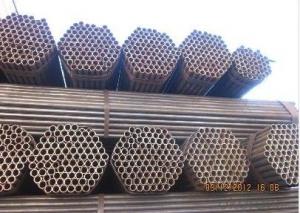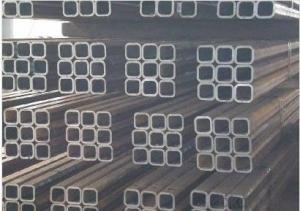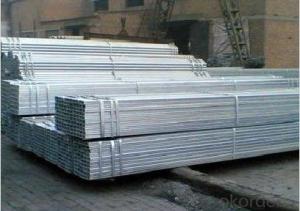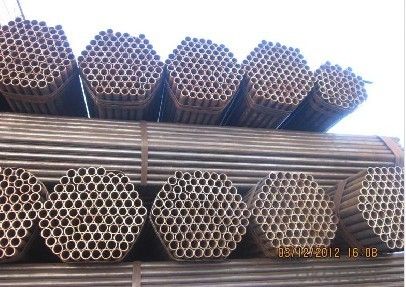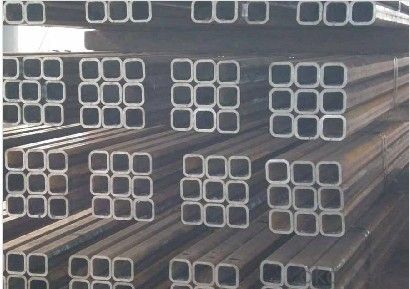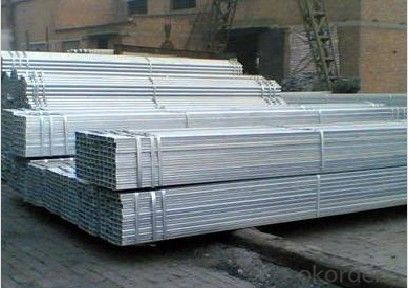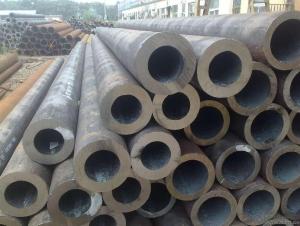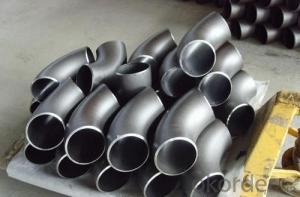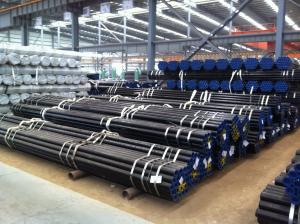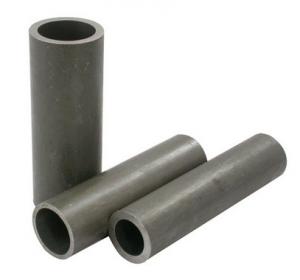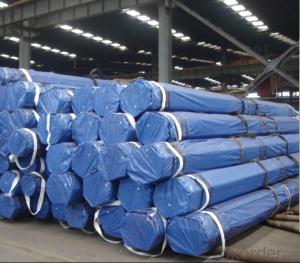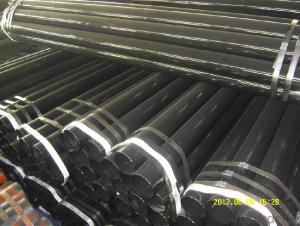Hot API 5L Carbon Steel Tube 4'' SCH40 from cnbm
- Loading Port:
- Tianjin
- Payment Terms:
- TT or LC
- Min Order Qty:
- 50 m.t.
- Supply Capability:
- 20000 m.t./month
OKorder Service Pledge
OKorder Financial Service
You Might Also Like
1、Structure of Hot API 5L Carbon Steel Tube 4'' SCH40:
Hot API 5L Carbon Steel Tube 4'' SCH40 is formed by drawing a solid billet over a piercing rod to create the hollow shell. As the manufacturing process does not include any welding, seamless pipes are perceived to be stronger and more reliable. Historically seamless pipe was regarded as withstanding pressure better than other types, and was often more easily available than welded pipe.
2、Main Features of Hot API 5L Carbon Steel Tube 4'' SCH40:
• High manufacturing accuracy
• High strength
• Small inertia resistance
• Strong heat dissipation ability
• Good visual effect
• Reasonable price
3、Hot API 5L Carbon Steel Tube 4'' SCH40 Specification:
Standard | GB, DIN, ASTM ASTM A106-2006, ASTM A53-2007 |
Grade | 10#-45#, 16Mn 10#, 20#, 45#, 16Mn |
Thickness | 8 - 33 mm |
Section Shape | Round |
Outer Diameter | 133 - 219 mm |
Place of Origin | Shandong, China (Mainland) |
Secondary Or Not | Non-secondary |
Application | Hydraulic Pipe |
Technique | Cold Drawn |
Certification | API |
Surface Treatment | factory state or painted black |
Special Pipe | API Pipe |
Alloy Or Not | Non-alloy |
Length | 5-12M |
Outer Diameter | 21.3-610mm |
Grade | 20#, 45#, Q345, API J55, API K55, API L80, API N80, API P110, A53B |
Standard | ASME, ASTM |
1) Material:20#(ASTM A 106/A53 GRB.API5LGRB,GB),45#,16Mn,10#.
2) Specification range:OD:21.3-610mm,WT:6-70mm,length:6-12m or according to the requirement of clients.
3) Excutive standards:GB,ASME API5L.ASTM A 106/A53,Despite of the above standards,we can also supply seamless steel pipe with standard of DIN,JIS,and so on,and also develop new products according to the requirements of our clients!
4) Surface:black lacquered,varnish coating or galvanized.
5) Ends:Beveled or square cut,plastic capped,painted.
6) Packing:bundles wrapped with strong steel strip,seaworthy packing.
4、Packaging & Delivery
Packaging Details: | seaworthy package,bundles wrapped with strong steel strip |
Delivery Detail: | 15-30days after received 30%TT |
5、FAQ of Hot API 5L Carbon Steel Tube 4'' SCH40:
①How is the quality of your products?
Our products are manufactured strictly according to national and internaional standard, and we take a test
on every pipe before delivered out. If you want see our quality certifications and all kinds of testing report, please just ask us for it.
Guaranteed: If products’ quality don’t accord to discription as we give or the promise before you place order, we promise 100% refund.
②How about price?
Yes, we are factory and be able to give you lowest price below market one, and we have a policy that “ for saving time and absolutely honest business attitude, we quote as lowest as possible for any customer, and discount can be given according to quantity”,if you like bargain and factory price is not low enough as you think, just don’t waste your time.Please trust the quotation we would give you, it is professional one.
③Why should you chose us?
Chose happens because of quality, then price, We can give you both.Additionally, we can also offer professional products inquiry, products knowledge train(for agents), smooth goods delivery, exellent customer solution proposals.Our service formula: good quality+good price+good service=customer’s trust
SGS test is available, customer inspection before shipping is welcome, third party inspection is no problem.
6、Hot API 5L Carbon Steel Tube 4'' SCH40 Images:
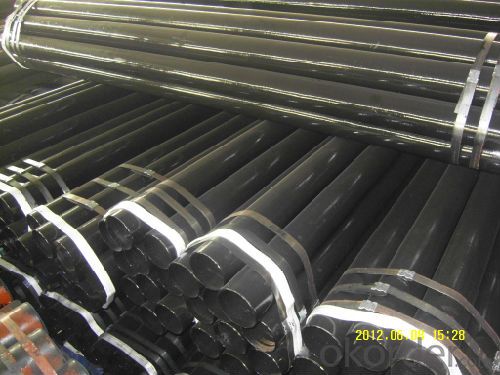
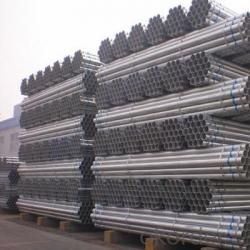
- Q: How are steel pipes graded?
- Steel pipes are graded based on various factors such as the composition of steel, manufacturing process, and physical properties like strength, durability, and corrosion resistance. These grades are assigned based on internationally recognized standards such as ASTM, API, and ISO, which provide specific criteria for different applications and industries.
- Q: How do you calculate the flow rate in a steel pipe?
- To calculate the flow rate in a steel pipe, you need to consider the pipe's diameter, length, and the pressure difference across it. By applying the Bernoulli's equation or using the Darcy-Weisbach equation, you can determine the flow rate based on these variables.
- Q: What is the difference between steel pipes and HDPE pipes?
- Steel pipes are made from a durable alloy of iron and carbon, while HDPE pipes are made from high-density polyethylene, a strong and flexible plastic material. Steel pipes are generally heavier and more rigid, making them suitable for high-pressure applications and structural support. HDPE pipes, on the other hand, are lighter, more flexible, and resistant to corrosion, making them ideal for underground and aboveground installations in various industries including water supply, gas distribution, and sewage systems.
- Q: Are steel pipes suitable for desalination plants?
- Yes, steel pipes are suitable for desalination plants. Steel pipes offer several advantages that make them a suitable choice for desalination plants. Firstly, steel pipes are highly resistant to corrosion, which is crucial in desalination plants where the presence of saltwater can be highly corrosive. The corrosion resistance of steel pipes ensures the longevity and durability of the infrastructure, reducing maintenance and replacement costs. Secondly, steel pipes have high strength and can withstand high-pressure conditions, which are often required in desalination plants. The ability of steel pipes to handle high-pressure water flow without any deformations or leaks ensures the efficient and reliable operation of the desalination process. Furthermore, steel pipes have excellent heat resistance properties, making them suitable for desalination plants that often involve heat-intensive processes such as distillation or reverse osmosis. Steel pipes can withstand high temperatures without any structural damage, ensuring the safe and efficient transfer of heated water or steam. In addition, steel pipes are readily available and have a wide range of sizes and specifications, allowing for flexibility in design and construction of desalination plants. This availability and versatility make steel pipes a cost-effective choice for desalination projects. Overall, due to their corrosion resistance, high strength, heat resistance, availability, and cost-effectiveness, steel pipes are highly suitable for desalination plants and are widely used in the industry.
- Q: How are steel pipes used in the chemical industry?
- Steel pipes are extensively used in the chemical industry for various applications, including transportation of chemicals, gases, and liquids. They are highly durable, corrosion-resistant, and can withstand high pressure and temperature conditions. Steel pipes are used in chemical plants for the transfer of raw materials, intermediate products, and final products within the production process. They are also employed for the distribution of utilities such as water, steam, and compressed air. Additionally, steel pipes are utilized for the construction of storage tanks, reactors, and other equipment in the chemical industry due to their strength and reliability.
- Q: Can steel pipes be used for sewage systems?
- Yes, steel pipes can be used for sewage systems. Steel pipes are commonly used in sewage systems for their durability, strength, and resistance to corrosion. They are suitable for transporting sewage and wastewater, ensuring reliable and long-lasting performance.
- Q: What is the difference between black steel pipe and galvanized steel pipe?
- The main difference between black steel pipe and galvanized steel pipe lies in their coating. Black steel pipe is untreated and has a dark, matte appearance, while galvanized steel pipe is coated with a layer of zinc to prevent rusting and has a silver, shiny appearance. This coating makes galvanized steel pipes more durable and suitable for outdoor use, while black steel pipes are commonly used for indoor plumbing and gas lines.
- Q: What are the applications of steel pipes?
- Steel pipes have a wide range of applications in various industries due to their durability, strength, and versatility. Some of the common applications of steel pipes include: 1. Plumbing and water distribution: Steel pipes are commonly used in plumbing systems to transport water and other fluids. They are resistant to corrosion and can withstand high pressure, making them ideal for water distribution networks in residential, commercial, and industrial buildings. 2. Oil and gas industry: Steel pipes are extensively used in the oil and gas industry for the transportation of oil, natural gas, and other petroleum products. They are able to handle high-pressure and high-temperature environments, making them crucial in drilling, production, and refining processes. 3. Construction and infrastructure: Steel pipes are widely employed in construction projects for various purposes such as structural support, foundations, scaffolding, and underground piping systems. They provide a strong and reliable framework for buildings, bridges, tunnels, and highways. 4. Industrial applications: Steel pipes are used in various industrial applications such as manufacturing, power plants, chemical processing, and food processing. They are often used to transport liquids, gases, or slurries within the production processes or to transfer heat in heat exchangers and condensers. 5. Agricultural sector: Steel pipes are commonly used in the agricultural sector for irrigation systems, particularly in large-scale farming. They are used to transport water from a water source to the fields, ensuring efficient and controlled water distribution. 6. Mining industry: Steel pipes are utilized in the mining industry for the extraction and transportation of minerals, ores, and other mining materials. They are resistant to abrasion and corrosion, making them suitable for the harsh and demanding conditions of mining operations. 7. Mechanical and automotive applications: Steel pipes find application in the manufacturing of various mechanical components, such as automotive exhaust systems, hydraulic cylinders, and precision tubing. They offer high strength, dimensional stability, and resistance to impact and vibration. 8. Infrastructure and utilities: Steel pipes are commonly used in infrastructure projects for the transportation of sewage, stormwater, and wastewater. They are durable, resistant to chemical corrosion, and can withstand underground conditions, making them suitable for sewer and drainage systems. In summary, the applications of steel pipes are vast and diverse, ranging from plumbing and water distribution to oil and gas industry, construction, agriculture, mining, mechanical and automotive sectors, and infrastructure projects. Their robustness, versatility, and ability to withstand extreme conditions make them a fundamental component in numerous industries.
- Q: What are the different methods of joining steel pipes for oil and gas pipelines?
- There are several methods of joining steel pipes for oil and gas pipelines, including welding, threading, and flange connections. Welding involves heating the ends of the pipes and fusing them together, creating a strong and seamless joint. Threading, on the other hand, involves cutting threads on the pipe ends and using threaded fittings to connect them. Flange connections use flanges and bolts to join the pipes together, allowing for easy disassembly and maintenance. Each method has its advantages and is chosen based on factors such as pipeline design, specifications, and project requirements.
- Q: What is the difference between steel pipes and polyethylene pipes?
- Steel pipes are made of a strong and durable material, steel, which makes them suitable for high-pressure and high-temperature applications. They are also resistant to corrosion, making them ideal for transporting liquids and gases. On the other hand, polyethylene pipes are made of a flexible plastic material, which makes them easier to install and handle. They are lightweight, resistant to chemicals, and have a low risk of corrosion. However, they may not be suitable for very high-pressure or high-temperature applications.
Send your message to us
Hot API 5L Carbon Steel Tube 4'' SCH40 from cnbm
- Loading Port:
- Tianjin
- Payment Terms:
- TT or LC
- Min Order Qty:
- 50 m.t.
- Supply Capability:
- 20000 m.t./month
OKorder Service Pledge
OKorder Financial Service
Similar products
Hot products
Hot Searches
Related keywords
